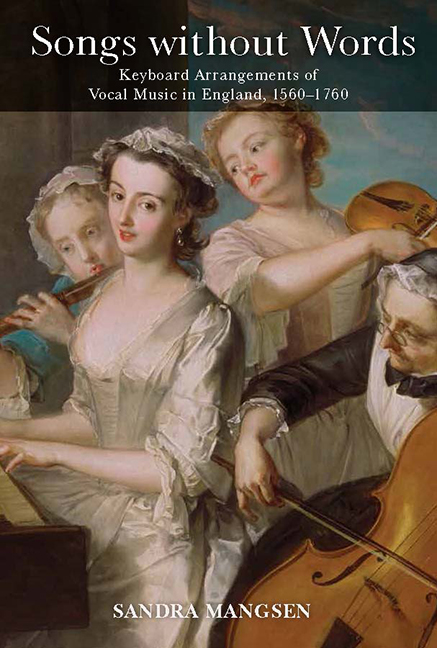Book contents
- Frontmatter
- Dedication
- Contents
- List of Illustrations
- Preface
- Acknowledgments
- Abbreviations
- Introduction
- 1 Ballads Transformed
- 2 Arias Domesticated: The Ladys Entertainment and Other Early Eighteenth-Century Anthologies
- 3 With Their Symphonies: William Babell and The Ladys Entertainment Books 3 and 4
- 4 Opera Remix: Babell's Suits of 1717
- 5 After Babell: Arrangements for Ladies and Gentlemen
- 6 Afterthoughts
- Appendix The Ladys Banquet (Second Series): Contents, Concordances, and Dissemination
- Notes
- Bibliography
- Index
2 - Arias Domesticated: The Ladys Entertainment and Other Early Eighteenth-Century Anthologies
Published online by Cambridge University Press: 17 July 2019
- Frontmatter
- Dedication
- Contents
- List of Illustrations
- Preface
- Acknowledgments
- Abbreviations
- Introduction
- 1 Ballads Transformed
- 2 Arias Domesticated: The Ladys Entertainment and Other Early Eighteenth-Century Anthologies
- 3 With Their Symphonies: William Babell and The Ladys Entertainment Books 3 and 4
- 4 Opera Remix: Babell's Suits of 1717
- 5 After Babell: Arrangements for Ladies and Gentlemen
- 6 Afterthoughts
- Appendix The Ladys Banquet (Second Series): Contents, Concordances, and Dissemination
- Notes
- Bibliography
- Index
Summary
Contriv'd and Fitted to the Harpsicord or Spinnett
Manuscript and printed sources of keyboard music from the latter half of the seventeenth century contain both newly composed pieces and others derived from existing vocal and instrumental music. In his 1989 dissertation John Brian Hodge documented the large number of keyboard transcriptions in contemporary prints and manuscripts as well as the common practice of publishing theater music simultaneously in ensemble and keyboard versions. For instance, Hodge identified fourteen of the sixteen pieces in A Collection of Lessons and Aires (1702) as theater music, which was also available in four-part settings in Harmonia Anglicana, or The Musick of the English Stage. In the course of this chapter, it will be become evident that this 1702 anthology was far from unique. In addition to writing original keyboard music, late seventeenth-century composers had become adept at transforming popular songs, dances, and theater tunes into keyboard music that was printed in collections such as Playford's Musick's Hand-maid (1663, 1678, and 1689). In the preface to the 1689 edition Henry Playford described the content as “the Newest Tunes and Grounds, Composed by your ablest masters, Dr. John Blow, Mr. Henry Purcell, &c.” In this context we might think of Blow and Purcell more as arrangers than as composers, since much of the music in that book is derived from other sources rather than being newly composed. Indeed, the idea of “composition” in late seventeenth-century London included not only inventing something entirely new, but also making new “settings” of existing tunes, or adapting consort pieces for the keyboard. Andrew Woolley remarked in this connection that “Playford does not make a distinction between an ‘arranged’ tune and an ‘original’ harpsichord piece.”
Keyboard volumes published between 1690 and 1720 continue along the same path. We might divide them into two types: those devoted to a single composer and anthologies that include works by several composers. The collections devoted to a single author seem more likely to focus on original keyboard music, whereas the anthologies often contain only arrangements. This pattern may have been established during the Restoration, when the Playfords became prominent as music publishers. Rebecca Herissone has recently argued that during the Restoration English publishers developed a more commercial focus, favoring “multicomposer anthologies that are marketed primarily by their genre,” whose practical appeal to the consumer was evident in their titles.
- Type
- Chapter
- Information
- Songs without WordsKeyboard Arrangements of Vocal Music in England, 1560–1760, pp. 59 - 92Publisher: Boydell & BrewerPrint publication year: 2016
- 2
- Cited by

